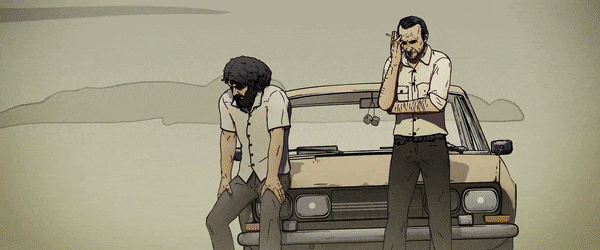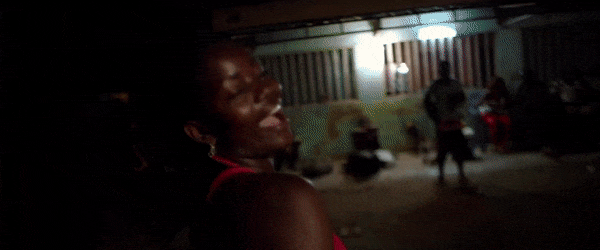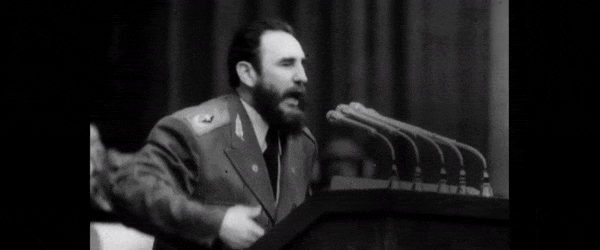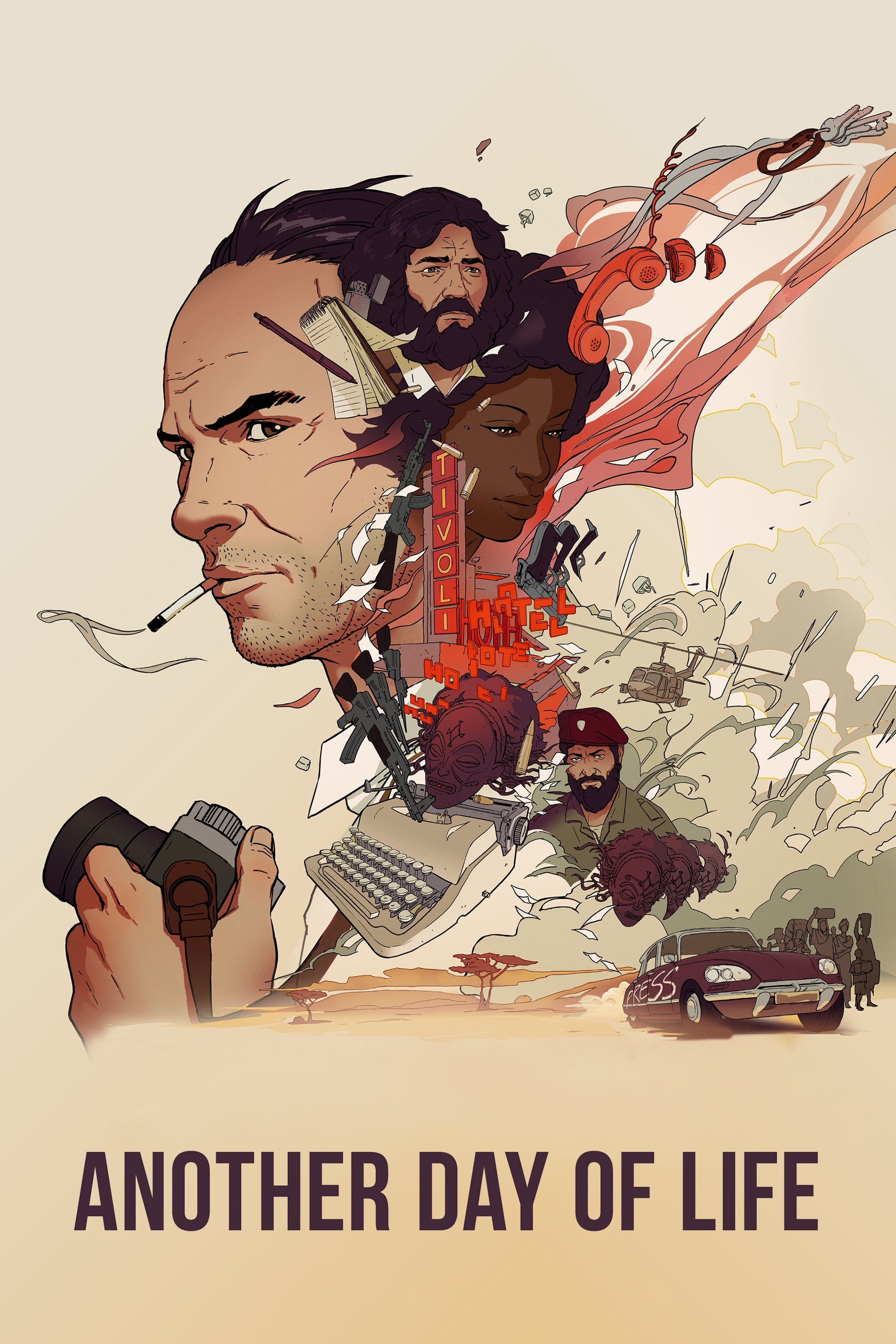Another Day of Life is a 2018 Polish-Spanish-Belgian-German-Hungarian animated feature co-production directed by Raúl de la Fuente and Damian Nenow, based on Ryszard Kapuściński's autobiographical account, Another Day of Life.
A gripping story of a three-month-long journey that renowned Polish reporter Ryszard Kapuscinski took across Angola, ravaged by a war in which the front lines shifted like a kaleidoscope, from one day to the next.

***SPOILER ALERT***
F: We got off to a strong start on our visit to Angola this week. It was almost certain that it had to be a film about war, since the country has been in a civil war since 1975 and until 2002. This is a non-fiction hybrid film of animation and documentary that is intertwined with my life and hence my interest is sharper than usual. My maternal family lived in Angola until the "revolution of the carnations" that took place in Portugal on April 25, 1974. The Portuguese left this African country after our revolution liberated us from the fascist regime installed since the approval of the Portuguese Constitution in 1933. Angolans then became independent on November 11, 1975, and became responsible for their destiny as a nation. Things didn't start on the right foot and this is the setting where we meet our main protagonist, war reporter Ryszard Kapuscinski AKA Ricardo who was 43 years old at the time.
K: Hello friends! The first day of films about Angola and we immediately plunged into the abyss of a tortured country that has not been left alone for centuries. Another Day of Life is based on the book of the same name by Polish journalist Ryszard Kapuściński. In 1975, he worked in an African country as a war correspondent, sending reports home directly from the line of fire. I liked the idea of combining animation and documentary in this film. The film received many awards and was among the nominees at film festivals in Cannes and Rotterdam. It was interesting for me to watch and I can say that I discovered a lot of new things for myself, since, honestly, I was not interested in the history of Angola.
 |
| Lucky bastards. |
F: I'm not a big fan of the type of animation present in the film, Rotoscoping, made famous by the film A Scanner Darkly, but I didn't dislike the animations. What I found very interesting was the mix that was made between real images of the places, the people of Angola, and the interviews with people of Pele e Osso (real people) who were part of this horrible adventure in which our reporter Poláco took us, people such as freelance journalist Artur Queiroz, commander Farrusco or Luís Alberto. What was also really impressive was the way the memory of some combatants was preserved, specifically the case of Carlota Machado. It is sadly fascinating to see real photos and footage of people who disappeared from the face of the earth so long ago and while they were so young.
K: I liked the editing of the film too, the alternation of animation and natural shooting did not get out of the story at all and did not change the atmosphere. I think it's a great idea, because the film can interest a decent number of young people, make them look at the current events in a different way and want to study the issue of many years of unrest in Angola in more depth. I also liked the special effects, when the main character finds himself in a kind of surreal space of his impressions and thoughts. And as it turned out, the book by Ryszard Kapuściński also supplemented the facts with allegories, magical realism and surrealism.
 |
| In the streets of Angola. |
F: The weakest point of the movie is really the English speaking... Why do that when the Portuguese language is so beautiful? They should have been more faithful to the languages that would be spoken in that place during the story part of the movie, sometimes you could hear someone speaking in the local language but very rarely. I was curious to know how this Polish reporter of ours communicated with the people. I guess it would be in Spanish (a less beautiful language than Portuguese :P).
K: Perhaps the film would have been more colorful sounding only in Portuguese. But, we still have the story of a Polish journalist, and the fact that it was a cooperative work of different countries, makes it more accessible in English.
I think language doesn't really matter here, because the main idea of the film is the place of a journalist in history, the problem of choosing between professional duty and human duty. In this case, the way the story would turn out depended on the word of the journalist, whose side would win and whose side would lose.
 |
| Combatente Carlota |
F: I was totally astonished by the fact that I didn't know about South Africa having interfered in the civil war and invaded (yes invaded!) Angola, apparently under the support of the USA and the CIA, and having exterminated a large part of the MPLA forces on the southern border, in a completely asymmetric war. I don't have much historical knowledge about the interference of other countries and major world powers in Angola, but it seems to me that with the departure of the Portuguese, Angolans were doomed to suffer since the beginning of independence due to external political and economic interests that influenced the three main political and military forces (MPLA, FNLA and UNITA).
F: The film gives us a very positive light on the MPLA, Movimento Popular de Libertação de Angola, which at the time was supposed to be a communist party, and apparently the party elected and adored by the Angolan people. I won't be able to comment on this matter, but it seems to me a bit one-sided. All I know for sure is that the United States are sons of bitches, and wherever they go, there is only chaos and destruction, and in this case, a lot of confusão. I also had no idea about Cuba's intervention and found that little excerpt of Fidel Castro at the United Nations talking about supporting Angola quite inspiring. With each passing day more and more I identify with the communist ideology... Probably if it weren't for the hundreds of sanctions and interventions made by the western world, socialism, and where it was established would not have been such a failure as history tells us.
K: I am extremely sorry that Angola has become a chessboard on which the so-called superpowers measured their strength and are indifferent to human lives.
 |
| Fidel Castro sent 30.000 troops to Angola in response to the South African invasion. |
F: There is a lot to say about this documentary animation, but here we like to keep things short and sweet. This movie is worth seeing to learn about the extraordinary and brave adventure of reporter Kapuscinski and to raise interest in the modern history of Angola. I will definitely read the books of this master of literary journalism where he witnessed first-hand the end of the European colonial empires on the African continent.
K: Definitely recommend to watch, as the authors of the film managed to convey a decent amount of information and historical facts in 80 minutes, while showing how one person can change the course of events. Journalism students must see.
PS: Already ordered the book "The Shadow of the Sun" :)
Freddy's Score: 94/100
Krasnaya's Score: 90/100
FINAL SCORE

ARTUR
CARLOTA
DECISIONS
Our blog is updated every day at 21:00 (WEST).


Comments
Post a Comment